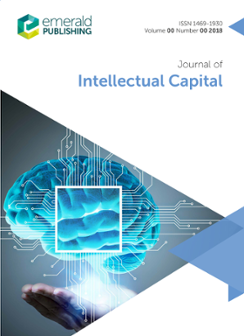The roots of “volunteer” employees’ engagement: The silent role of intellectual capital in knowledge-sharing intentions
IF 6.8
2区 管理学
Q1 BUSINESS
引用次数: 18
Abstract
PurposeThe main aim of this paper is to demonstrate that “volunteer” employees’ perception of dimensions of intellectual capital (IC) – human, structural and relation capital – creates a motivational environment to enhance knowledge-sharing intention (KSI) and stimulates “volunteer” employee engagement (VEE). The model is applied on the non-profit organizations (NPOs) sector that base their path on sharing values with volunteers and employees in relation to which they have to implement engagement strategies that are beneficial to both developing and deploying individual and organizational human capital.Design/methodology/approachTo verify the existence of relationships between the constructs of IC, KSI and VEE a partial least squares structural equation model on a sample of 300 “volunteer” employees of NPOs was tested to verify the research hypotheses, as this could explain the causal relationships.FindingsThe results confirm that KSI is positively and directly influenced by the favourable environment resulting from the motivations below the dimensions of IC. The improvement of KSI, determined by IC, has a positive effect on VEE.Research limitations/implicationsDespite the limitation created by the peculiarities of NPOs and the role of volunteers, this paper suggests a strategic approach that the management could implement to create an environment based on the exchange of knowledge and to increase engagement in the value co-creation process.Originality/valueThe ability of a company to adopt sharing strategies depends on the existence of an environment in which individuals are willing to exchange knowledge realizing mutual benefits. The work broadens this perspective by providing governance with a behavioural model that creates a direct relationship between IC, KSI and VEE.“志愿者”员工敬业度的根源:智力资本在知识共享意图中的无声作用
本文的主要目的是证明“志愿者”员工对智力资本(IC)维度(人力资本、结构资本和关系资本)的感知创造了一个激励环境,以增强知识共享意愿(KSI)并刺激“志愿者”员工敬业度(VEE)。该模型应用于非营利组织(NPOs)部门,这些组织的发展道路基于与志愿者和员工分享价值观,因此他们必须实施有利于开发和部署个人和组织人力资本的参与战略。设计/方法/方法为了验证IC、KSI和VEE结构之间的关系是否存在,我们采用偏最小二乘结构方程模型对300名非营利组织“志愿者”员工进行了检验,因为这可以解释因果关系。研究结果证实,企业绩效满意度受到企业绩效维度以下动机所产生的有利环境的直接积极影响。企业绩效满意度的提高,由企业绩效决定,对企业绩效有积极影响。尽管非营利组织的特殊性和志愿者的作用造成了限制,但本文提出了一种管理层可以实施的战略方法,以创造一个基于知识交流的环境,并增加在价值共同创造过程中的参与度。原创性/价值一个公司采用共享战略的能力取决于是否存在一个环境,在这个环境中,个人愿意交换知识,实现互利。这项工作通过提供一种行为模型来建立IC、KSI和VEE之间的直接关系,从而拓宽了这一视角。
本文章由计算机程序翻译,如有差异,请以英文原文为准。
求助全文
约1分钟内获得全文
求助全文
来源期刊

Journal of Intellectual Capital
Multiple-
CiteScore
14.50
自引率
13.30%
发文量
27
期刊介绍:
The Journal of Intellectual Capital is a peer-reviewed international publication dedicated to the exchange of the latest research and best practice information on all aspects of creating, identifying, managing and measuring intellectual capital in organisations. The journal publishes original research and case studies by academic, business and public sector contributors on intellectual capital strategies, approaches, frameworks, tools, techniques and technologies in order to increase the understanding of intellectual capital within the context of the modern knowledge economy. The focus of this journal is on the identification of innovative intellectual capital strategies and the application of theoretical concepts to real-world situations.
 求助内容:
求助内容: 应助结果提醒方式:
应助结果提醒方式:


